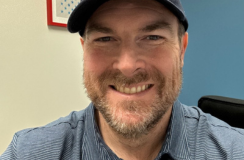t’s been five years since Nick Haschka acquired office plant supplier The Wright Gardner, which turned out to be his first of 10 such acquisitions.
The previous owner was retiring, and when news of the acquisition got out to others in the small world of companies supplying plants to businesses, Nick and his business partner Anu Sharma were flooded with more opportunities. Nick told that story in detail in a previous episode of Acquiring Minds.
He returned to the show to talk about his recent Twitter thread, in which he offered a retrospective of the past half decade.
In his tweets, Nick explained how the landscape has changed for other small-time investors looking to acquire existing small businesses.
“[No-code tools] allow you to do things on a scale and with a level of consistency that was never possible before.”
For starters, the supply of businesses owned by imminently retiring baby boomers has started thinning.
At the same time, private equity firms are moving away from low-risk, low-maintenance companies with intact management and stable strategies, to the more hands-on opportunities someone like Nick prefers.
Add MBAs who’ve learned about the benefits of acquiring an existing company in business school, and you have a significantly more crowded market.
Not that Nick is entirely pessimistic. He says that “no-code” tools — software that allows non-developers to build apps and other services — have made it easier and more affordable for small business owners to expand their capabilities in ways that would have been impossible five years ago.
In this episode, Nick explains how changes in the market have moved private equity firms onto small-time buyers’ turf, how he’s used no-code tools to boost his businesses, and why the silver tsunami is starting to ebb.
Check out:
✳️ Top takeaways from the episode
✳️ Episode highlights with timestamps
Acquisition Entrepreneur: Nick Haschka
💵 What he acquired: Acquiring Minds listeners may remember Nick’s earlier episode, in which he explained how he went from acquiring one office plant supplier, The Wright Gardner, to building a mini empire made up of similar companies. Nick is also a founder of Cub Investments, and popular on SMB Twitter.
💡 Key quote: “A lot of turnover has happened in the last five years. A lot of the best stuff [has sold]. And there's probably been a big culling of the herd because of COVID. Businesses that may previously have been thought sellable may not be sellable or may be closed. So there's a pretty sizable shock going on.”
👋 Where to find him: LinkedIn | Twitter

Acquisition Tips From the Episode
Top takeaways from this conversation
🤑 Private equity firms and MBAs are competing to acquire businesses normally favored by small-time buyers.
When Nick acquired The Wright Gardner five years ago, private equity firms tended to buy companies that already had a stable management team in place and didn’t need overhauling. These were considered less risky propositions than smaller, messier businesses that required operational restructuring. These latter kinds of businesses were therefore more readily available to individual buyers and searchers, who had the time and motivation to get their hands dirty.
Fast forward to today, and opportunities in private equity’s preferred mold have become scarce. Which means these firms are starting to take on more companies in the latter category. That translates to more competition for those small-time buyers, who can’t compete with private equity when it comes to offers.
On top of that, business schools have wised up to the model of buying an existing company, and started training students in this method (i.e. ETA and search funds). "The secret's out," says Nick. The result is even more competition in the lower middle market.
🌊 The silver tsunami fueled has peaked.
The term “silver tsunami” was coined to describe the surge of baby boomers selling their businesses and retiring. This created lots of opportunities for small-time buyers to snap up a well-managed, established company.
Five years later, Nick observes, the best of those boomer businesses have been bought. And the COVID-19 pandemic has further accelerated the end of this silver rush. Many companies that were thriving up until early 2020 were hit badly by the loss of business precipitated by the pandemic. Taking on one of those companies may now be more trouble than it’s worth. And even if there’s a will on the buyer’s end, the pandemic also made it harder to get financial backing for a potentially risky business.
That’s not to say there are no golden — or rather silver — opportunities out there any more. But it’s harder to find them now, according to Nick, and they’re only going to get more scarce.
🖥️ No-code tools have made custom software accessible to operators.
It used to take a team of developers multiple weeks to build an app that did fancy things like automatically create a customizable schedule. The price tag attached to these kinds of projects pushed them out of reach for many small business owners.
Now, small business owners have access to affordable “no-code” software that makes it possible for someone who has never written a line of code to build functionality that can dramatically improve business operations.
Nick says that he’s used a tool called AppSheet to automate processes that used to be manual, such as email notifications and an appointment system for customers. There are lots of other options, depending on what you need and your technical comfort level.
Even if you don’t want to build the no-code automations yourself, the tools make it faster and easier — and cheaper — for developers to build out what you need.

Episode Highlights
Inflection points from the show
[2:29] The silver tsunami has crested: The term “silver tsunami” refers to the increase in baby boomers selling their businesses so they could retire. Nick believes we’re on the back half of that demographic trend, a process sped up by COVID-19.
[4:51] The wave will subside at different times in different industries: Retirement age varies depending on the industry you’re in. For example, running a barbershop may fit in more with an older person’s lifestyle than running a landscaping company.
[5:11] There will be a few ripples left: It’s not impossible to buy one of these boomer businesses now — it’s just harder (and only going to get more so).
[7:07] Private equity’s safe bets: When Nick started acquiring office plant suppliers, private equity firms were busy backing lower risk companies, which had management teams intact and didn’t need a significant overhaul.
[8:14] The safe bets are off: Those relatively low risk opportunities are running dry, leaving private equity firms to move "down market" toward companies that generate less revenue and need more work — exactly the kinds of companies acquisition entrepreneurs seek.
[10:49] A crowded market: In addition to the private equity firms, small business owners are having to compete with MBAs. Business schools have figured out that buying an existing company can be a good career path for their students.
[12:53] Finding labor is laborious: It’s harder than ever to find skilled or unskilled labor, especially in the trades, which tend to be disproportionately made up of older people, who are now retiring. The labor shortage isn’t at emergency levels yet, but if you’re looking at buying a business that relies on this type of labor, factor it into your plans.
[14:43] B2C is beating B2B: With many businesses still remote, the B2B companies that are doing well right now are serving a global audience. Local B2B companies are struggling. At the same time, employees are spending on their homes, so home services businesses serving consumers directly are doing better.
[18:17] The B2B exception: If you’re a B2B company and there is a consumer at the end of the transaction, you have more opportunities. For example, if you’re selling pool parts to residential pool builders.
[18:57] Not ripping out the roots: Nick doesn’t plan to switch The Wright Gardner back to B2C. “Over the years, we’ve pivoted away from residential, and designed the business away from it. It hasn't gotten dire enough to start moving back yet,” he says.
[19:20] Expanding your no-code toolbox: The surge in no-code software has made it possible for small business owners to make technical leaps forward for much less than it used to cost to hire a developer.
[20:10] No-code FTW: No-code tools have helped Nick with scheduling, an appointment system, and automated emails and notifications. “What we do now is administratively 100 times more complicated than what we used to do. And we've only been able to get there without 100 times the administrative expense through customizing these tools,” he says.
[23:01] A step up from spreadsheets: Nick says that if you can handle a spreadsheet, you can use no-code tools. They make it easier and faster for professionals too, meaning it’s now cheaper for you to hire a developer than it was five years ago if you aren’t comfortable tackling an app yourself.
Links & Mentions
✅ Nick’s first episode of Acquiring Minds
* Thumbnail image credit to The Economist
* Header image credit to Striped Ape Digital Media








%20-%20thumbnail.png)






%20-%20thumbnail.png)



%20-%20thumbnail.png)

.png)




%20-%20thumbnail.png)















%20-%20thumbnail.png)
































































